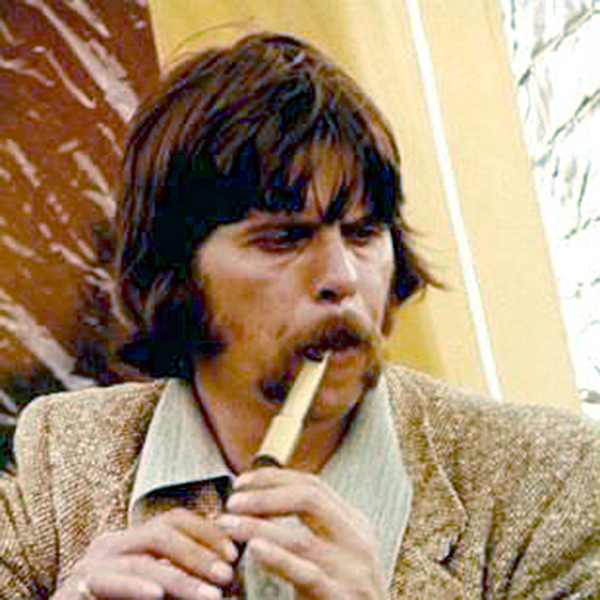
Folklincs
Folk Music ♫ Tuition ♫
Folklincs Band ♫
Youthlincs ♫



Folk History in Lincolnshire & Beyond
Lincolnshire has been very popular with folk collectors. Percy Grainger, Peter Kennedy, Robert Pacey, Mabel Peacock, Brian Dawson, Ethel Rudkin and Maurice Ogg are just some of the collectors interested in this area.
When Folklincs were collecting material for the folk map we were lucky enough to be given a large part of the manuscript and song collection that Maurice Ogg put together while he was alive. We are very grateful to John Baker, Hugh Scullion and the late Bob Cleveland for this, as it has provided an excellent insight into the life of a fairly modern day collector.
His connections with some of the other modern collectors such as Ethel Rudkin, Brian Dawson and Robert Pacey are also fascinating.
Maurice Ogg

Maurice was a prolific collector in the Coleby and Scunthorpe area. His life was short. He was only 34 when he died in 1980. He was a carpenter and joiner by trade and through his work he met and recorded many of the local residents singing songs which may have been lost without his patience and preservation.
His brother David Ogg who lived next door to Maurice remembers Roy Palmer coming to the house to do this recording when David was a boy. David gave us a tape his mother had recorded from the radio when these recordings were first played. Apparently their Mother scolded Maurice because of his broad Lincolnshire accent as she felt he should have tried to speak in a more proper manner.
Maurice’s greatest legacy was the creation of the Coleby Plough Play which he revived from snippets of plays he collected from residents in the Scunthorpe and Coleby area. The first performance of this play was in 1973 and has been performed every year since except when the country was in lock down. 2023 is the fiftieth anniversary of the Coleby Plough play.
Plough plays used to be performed in many villages in the the North Lincolnshire area. Here are some reflections by Bob Cleveland of that first performance in 1973:
“We performed in the Lord Roberts bar. In those days, women weren’t allowed in there. No-one seemed to pick out Jan Oliver as a woman, but there was a few strange looks at Martin Simpson (The Lady).”
Folklincs will be publishing more information about the Coleby Plough Jag and other plough plays in the near future.
Maurice also wrote a few songs and tunes the most popular being Sludger Tom, an amusing ditty about 2 dyke men.
Sludger Tom
If that’ll beer wi me a minute or two
A story I’ll relate….. concerning one called Sludger Tom, and how he met his fate.
Now Sludger Tom, he was the son of one called Welly-Bob Green, and a finer pair of Dyke men as ever could be seen.
Chorus
Indeed it is true, it is no lie, he never be seen again, for Sludger Tom, he dead and gone,…..resting in a drain
On every week day morning, you’d see ‘em on the sit up and begs all armed wi’ willow shove-i-ells and Welly’s to the tops of their legs, a-chawing a bit o’Back Twist, which was their chief delight. And sobbing at the gad-flies which have an oriole bite
A working down the sand-drain, or up by Haven End, the fettled up the nett-i-ells and shovelled around the bends. Only stopping at snap-time for a door stop laced wi cheese and a couple of Bradley app-i-ells and a chop of black-jack tea
It happened one misty morning as all do tell around, old Welly was shovelling silt and whistling a cheery old tune.
Young Sludge was there be’d Clough doors to see if they were free, he’d often pop behind them for a crafty cup of tea.
Just as he was returning thro’ the tide it shut him out, altho he screamed and yawped , poor sod! Old Welly need heard him shout, for Sludge had got his foot caught and tide was rising fast, a lapping per his welly tops, oh how long could he last— all sing the Chorus
Oh he’s drowned and thro’t Clough doors, to that land drain in the sky, where he’ll never be bothered with nett-i-ell or the stinging of the flies, he’ll sit there with his brambles , and doorstep laced with cheese, or thinking of happy memories and supping Black Jack Tea.
Notes:
(Black jack tea invented by bottles jack Drury to combat brewers droop) Sit up and begs - (Bikes)
The Lincolnshire Shepherd
Maurice Ogg also put a tune to a sheep counting song. The words of this song were written in the 1930s by Jesse Baggaley (1906-1976) of Lincoln, and the tune was added by Maurice Ogg in 1977. Brian Dawson another collector and friend of Maurice used to sing this.
I count 'em up to figgits, and figgits have a notch,
There's more to being a shepherd than being on a watch;
There's swedes to chop and lambing time and snow upon the rick,
Sethera, methera, bovera and covera up to dik.
From Caister down to Spilsby from Sleaford up to Brigg,
There's Lincoln sheep all on the chalk, all hung up wi' wool and big.
And I, here in Langton wi' this same old flock,
Just as me grandad did afore they meddled with the clock.
We've bred our tups and gimmers for the wool and length and girth,
And sheep have lambed, have gone away all o'er the earth.
They're bred in foreign flocks to give the woool its length and crimp,
Yan, tan, tethera, pethera, pimp.
They're like a lot of bairns, they are, like children of me own
They fondle round about owd Shep afore they're strong and grown;
But they gets independent -like, before you know they're gone,,
But yet again, next lambing time we'll 'a' more to carry on
Yan, tan, thethera, tethera, pethera, pimp,
Fifteen notches up to now and one ewe with a limp.
You reckons I should go away, you know I'll never go,
For lambing time's on top of us and it'll surely snow.
Well, one day, I'll leave me ewes, I'll leave me ewes for good,
And then you'll know what breeding is in flocks and human blood;
For our Tom's come out o' t army, his face as red as brick,
Sethera, methera, hovera, and covera up to dik.
Now lambing time come reg'lar-like, just as it's always been,
And shepherds have to winter 'em and tent 'em till they're weaned
My fambly had it 'fore I came, they'll have it when I sleep,
So we can count our lambing times as I am countin' sheep.
Mo also collected and carefully wrote out many tunes which were played in the local area. Many of these are from Joshua Gibbons collection. He apparently used to swap tunes with Ethel Rudkin too.
Some Tunes from the Maurice Ogg Collection